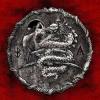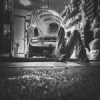Is it a sign of overly humid or a fact of life? I've had a heat lamp on my colonies so they would always get condensation on the walls. It was a little annoying to not be able to see inside the nest but never been a problem. For some reason, the Crematogasters today started climbing all over with brood and drowning themselves in the drops on the walls. So there I was, scraping brood and dead ants off the nest walls. Thankfully only a few went on that field trip.
- Formiculture.com
- Forums
- Gallery
- Members
- Member Map
- Chat

















